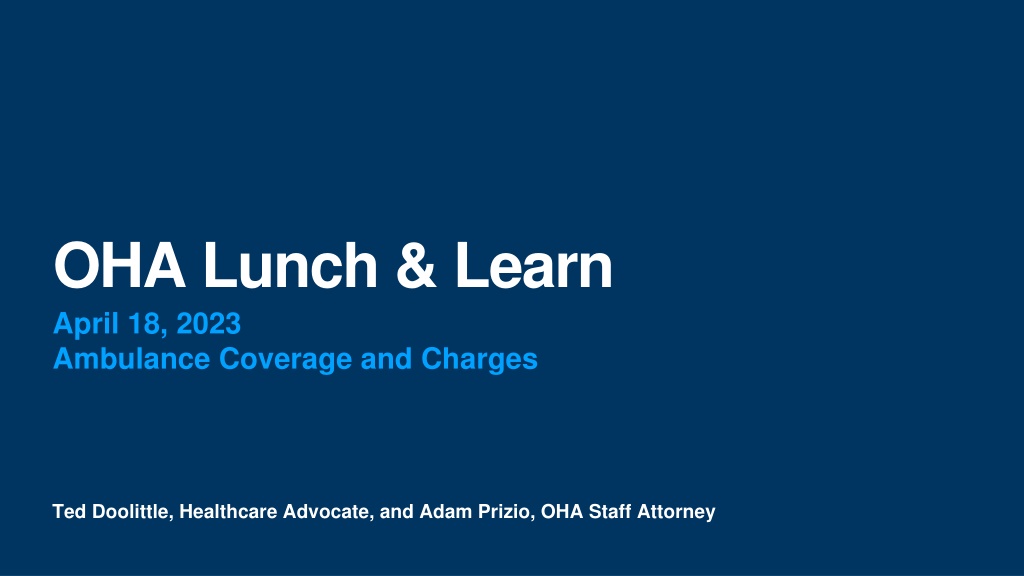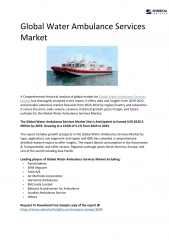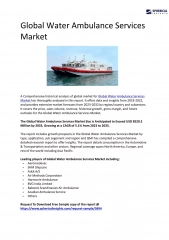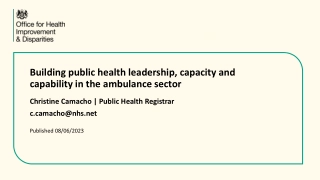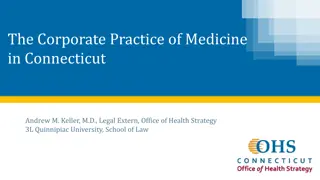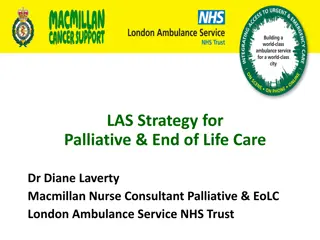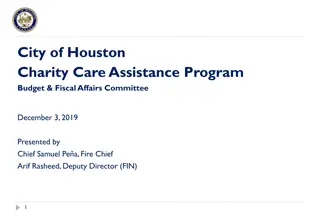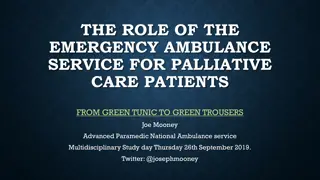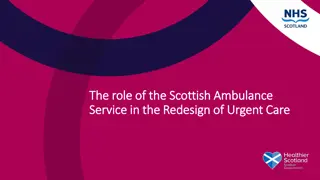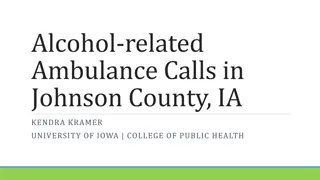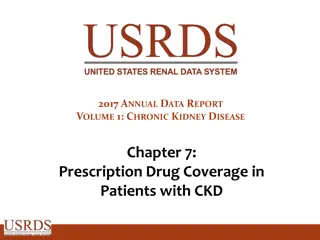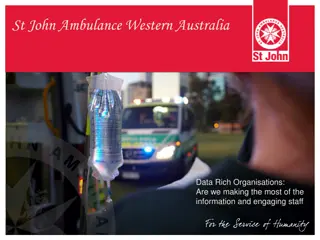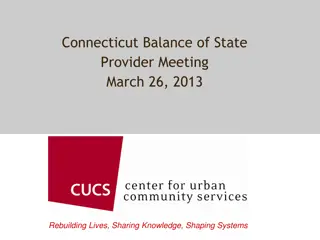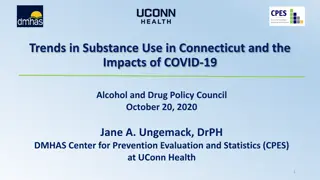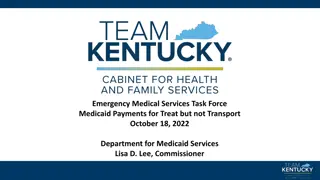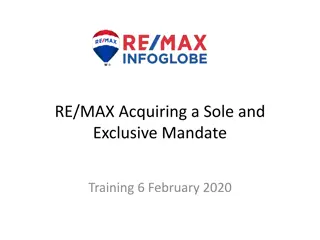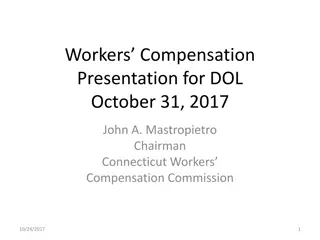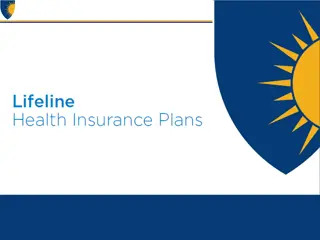Understanding Ambulance Coverage Mandates in Connecticut
The Office of the Healthcare Advocate in Connecticut assists consumers with healthcare and insurance issues. Different types of coverage like Fully Insured and Self-Insured plans are regulated by state and federal laws. Ambulance rates and coverage mandates are set annually, ensuring access to medically necessary ambulance services. Federal mandates under the ACA outline essential health benefits, including ambulance services. Understanding these mandates is crucial for ensuring coverage during medical emergencies.
Download Presentation

Please find below an Image/Link to download the presentation.
The content on the website is provided AS IS for your information and personal use only. It may not be sold, licensed, or shared on other websites without obtaining consent from the author. Download presentation by click this link. If you encounter any issues during the download, it is possible that the publisher has removed the file from their server.
E N D
Presentation Transcript
OHA Lunch & Learn April 18, 2023 Ambulance Coverage and Charges Ted Doolittle, Healthcare Advocate, and Adam Prizio, OHA Staff Attorney
Introduction What is the Office of the Healthcare Advocate? Created in 1999 as the Office of the Managed Care Ombudsman Name changed in 2005 to Office of the Healthcare Advocate Staff of Nurse Consultants, Attorneys, Paralegals, and other professionals Assist Connecticut consumers with healthcare and health insurance issues e.g., Doctor orders a procedure but insurance doesn t think it s necessary Free of charge to the consumer
A Word on Types of Coverage Different laws apply to different types of coverage Fully Insured plans are regulated by the State of Connecticut and must comply with State and Federal laws. Access Health CT Some employer-based health benefits Self-Insured plans are regulated by the Federal government; Connecticut laws do not apply. Employer-based health benefits Public plans include Medicare (Federal); HUSKY/Medicaid (State & Federal); TriCare (Federal) and each has its own body of law and regulation.
Ambulance Rates CGS 19a-177 Set annually by the Department of Public Health Office of Emergency Medical Services Establishes what an ambulance may charge, not what your insurance will cover Rates set every year based on cost reporting from ambulance companies
CT Ambulance Coverage Mandate CGS 38a-498 & 38a-525 Each health insurance policy in this state shall provide coverage for medically necessary ambulance services for persons covered by the policy. The policy shall, as a minimum requirement, cover such services whenever any person covered by the contract is transported when medically necessary by ambulance to a hospital. Such benefits shall be subject to any policy provision which applies to other services covered by such policies. Notwithstanding any other provision of this section, such policies shall not be required to provide benefits in excess of the maximum allowable rate established by the Department of Public Health in accordance with section 19a-177.
Federal Ambulance Coverage Mandate 42 USC 18022 ACA Essential Health Benefits (A) Ambulatory patient services. (B) Emergency services. (C) Hospitalization. (D) Maternity and newborn care. (E) Mental health and substance use disorder services, including behavioral health treatment. (F) Prescription drugs. (G) Rehabilitative and habilitative services and devices. (H) Laboratory services. (I) Preventive and wellness services and chronic disease management. (J) Pediatric services, including oral and vision care.
Medicare Ambulance Coverage Part B Covers medically necessary ambulance rides to Hospital Critical access hospital Rural emergency hospital Skilled Nursing Facility 20% coinsurance (unless covered by Medigap) Medicare Advantage must cover at least this same benefit if not better Ambulance company may require consumer to sign ABN if they don t believe Medicare will cover the trip.
Ambulance Coverage Mandate State and Federal Limits Coverage does not mean without cost share Both Connecticut and Federal law allow ambulance claims to be applied to your deductible and cost share What about Surprise Bills protections? Connecticut Surprise Billing law Federal No Surprises Act
Connecticut Surprise Billing Law CGS 38a-477aa Emergency Services includes emergency medical screenings as defined under EMTALA (42 USC 1395dd). This includes hospital-affiliated EMS. Claims for emergency services must be covered at the in-network level In-network deductible, in-network cost sharing
No Surprises Act Air Ambulances, not Ground Ambulances Ground ambulances not covered Air Ambulances are not allowed to balance bill consumers Balance billing is billing the difference between the adjusted amount and the billed amount. E.g., $1,000 billed amount, adjusted to $800, of which $500 is patient responsibility. An in-network provider would not be able to balance bill the $200 which came out in adjustment. Under the No Surprises Act, an air ambulance is not allowed to balance bill.
Thank You Questions? The Office of the Healthcare Advocate is here for YOU Office of the Healthcare Advocate P.O. Box 1543 Hartford, CT 06144 Toll-Free: 866-466-4446 Email: healthcare.advocate@ct.gov
